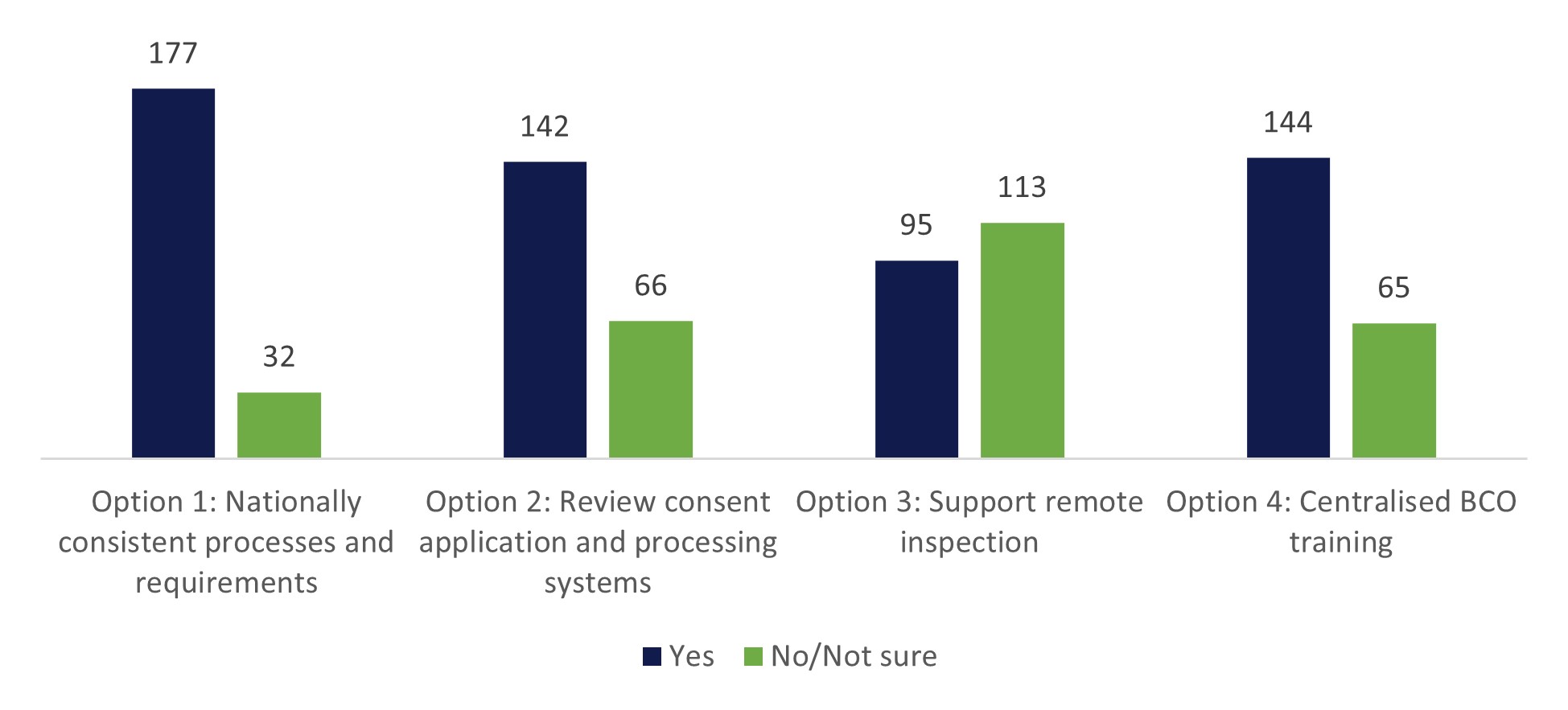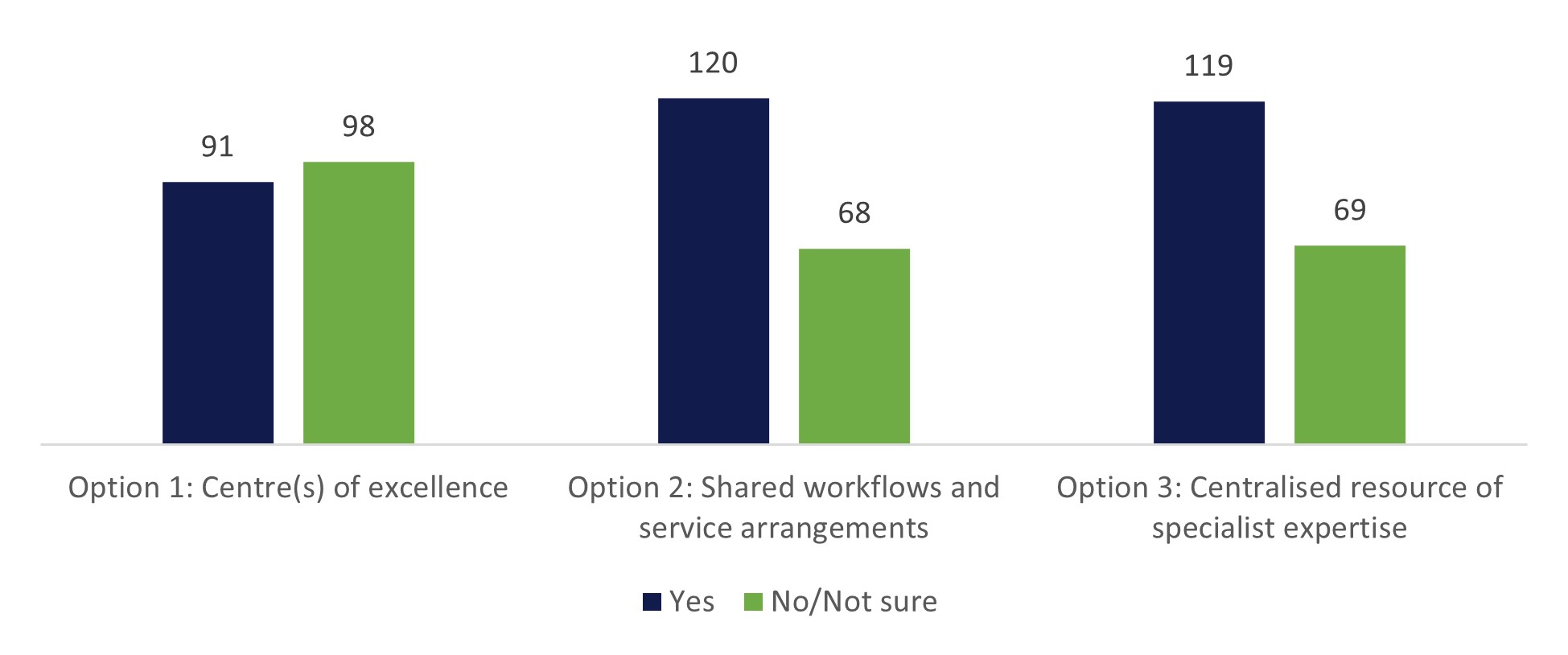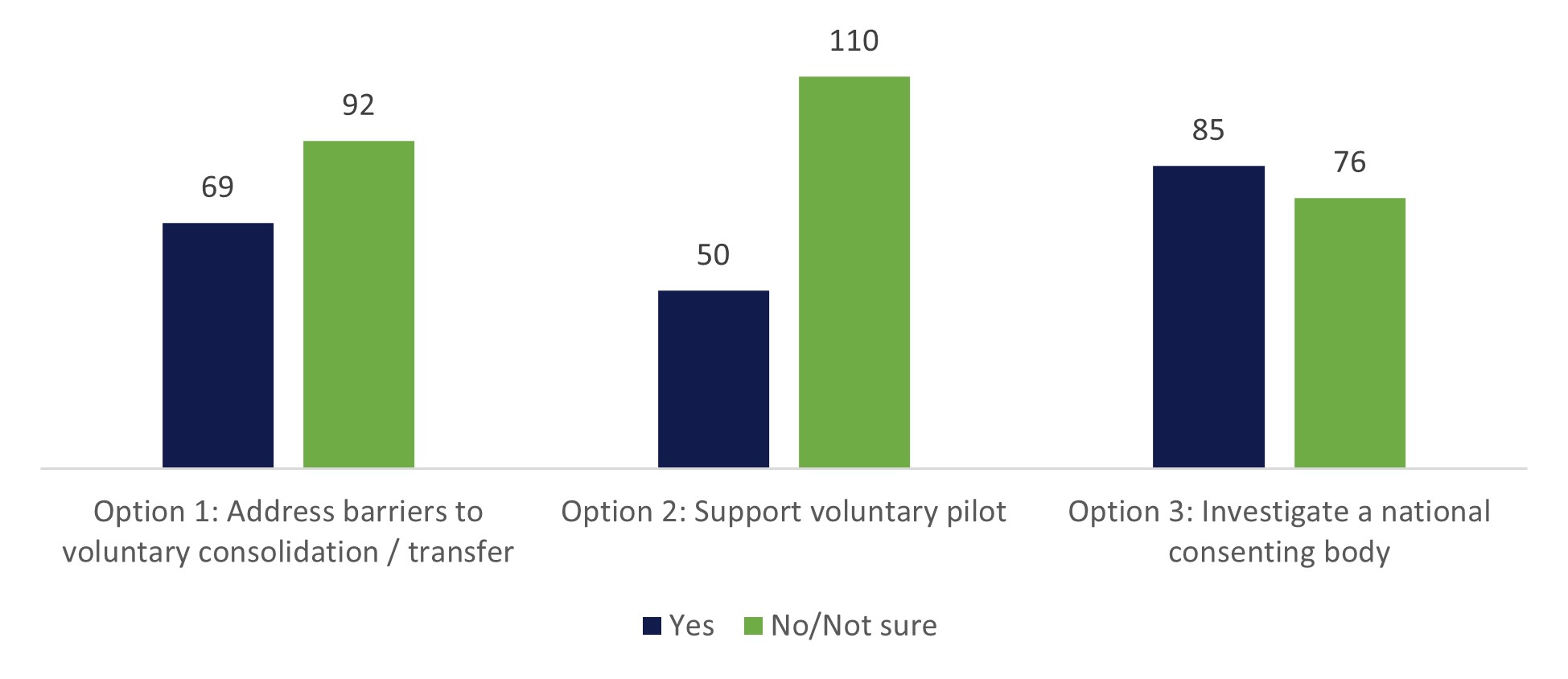More efficient and streamlined delivery of building consent services
The delivery of building consent services should be as consistent as possible, achieve economies of scale in delivery, and reduce duplication and unnecessary costs.
On this page
This chapter identified 10 initiatives in 3 categories, reflecting the key outcomes sought for the delivery of the building consent system. MBIE did not identify any preferred options as policy work is not advanced enough at this stage. For each outcome or category, submitters were asked which options would best deliver the desired outcome, what the costs and risks were, and whether there are other options MBIE should consider.
Category A: Providing greater national direction and consistency
- nationally consistent processes and requirements
- review consent application and processing systems (IT)
- support uptake of remote inspection
- centralised training for building control officers
Category B: Boosting capacity and capability across the system
- centre(s) of excellence or other advisory function
- shared workflows or shared service arrangements
- centralised resource of specialist expertise
Category C: Supporting building consent authorities to achieve greater economies of scale
- address barriers to voluntary consolidation
- pilot voluntary consolidation or transfer of functions
- investigate a national building consent authority
It is difficult to separate out or analyse these options into bounded categories as there are distinct overlaps and crossovers between them, with most addressing multiple issues and outcomes. For example, shared workflows or shared service arrangements (Category B) will also achieve greater economies of scale (Category C) and greater consistency (Category A).
MBIE heard from building consent authorities through submissions and targeted engagement that initiatives should mainly target consent applicants (i.e. designers, homeowners) to improve understanding of the requirements. However, most acknowledged that different building consent authority processes can make consent applications challenging and lead to different decisions. In contrast, many individual submitters believed that changes should target the regulators (i.e. MBIE and building consent authorities) or the consent system, including processes, practices, training, and legislation.
Common themes
As many of these categories and options overlap in terms of issues they address, submissions raised some common themes that focus on building consent functions or institutional or system capability:
- Submitters generally agreed that the delivery of the building consent system could be improved.
- There was strong support for improving consistency of consent services at a national level, particularly through nationally consistent processes and requirements and centralised training for building control officers. Consistency was also identified as a key benefit of several other options.
- There was strong support for boosting capability and capacity across the system through more coordination and joined-up service delivery, including through shared workflows or service arrangements and a centralised resource of expertise.
- Views were mixed on options around consolidation and aggregation, but some building consent authorities have indicated a willingness to explore voluntary consolidation or a national consenting body to sit alongside and support local building consent authorities with complex consents and work overflow.
- Building consent authorities were generally more supportive of all options.
Category A: Providing greater national direction and consistency
Submitters strongly supported improving consistency of consent services at a national level
Two hundred and eight submitters responded to all questions in this category. Twenty-five building consent authorities responded.
Most submitters thought consistency across and within building consent authorities was important and that the options were a good way of achieving it.
Of the 208 responses, 176 supported nationally consistent processes and requirements. It was generally seen as the most effective and easiest option to implement, however some submitters noted that a national consent system would be expensive and time consuming to create. Only 32 did not support it or were not sure.
A review of consent systems and centralised training for building control officers were supported by 142 and 143 submitters respectively, plus an additional submission explicitly supporting the latter[1]. Generally, submitters felt that these two options would improve consistency by targeting building consent authorities (option 2), building control officers and potentially other tradespeople (option 4). Some submitters thought both a review of consent systems and training should be done on an ongoing basis. A few also saw training as an opportunity to standardise core skills while simultaneously allowing for the development of specialist knowledge where necessary. It was generally seen as easy to implement compared to other options.
Submitters were divided on supporting the uptake of remote inspection – 95 said yes and 113 said no or were not sure. Of those who said no or not sure, 21 believed it has its place but there are liability risks, and it should only be used for certain purposes with proper controls and standards to prevent misuse, including having complementary in-person inspections.
The level of support from building consent authorities was similar, with the majority saying yes to nationally consistent processes and requirements, reviewing consent application and processing systems (IT) , and centralised training for building control officers.
There were a few additional comments about the need to prioritise the most cost-effective options, and the ability of ongoing consent system improvements and training to support smaller building consent authorities. Some building consent authorities are already using remote inspection technology or recognised that it has benefits when used it certain situations, but there are circumstances where it may not be suitable.
[1] This was a written submission that only commented on centralised training for building control officers and made no comment on other options.
Figure 10: Which options would best support consistency and predictability given costs, risks and implementation timeframes?

Text description
Other options
Submitters suggested a range of other options. The most common ones were:
- Create a national online consenting portal or system. There were also a couple of related comments that data standardisation would improve the evidence base for the consenting system.
- MBIE should provide consistent templates, codes of practice, FAQs, and other guides, and support building consent authorities to align their processes.
- MBIE should investigate a national qualification or degree for building control, potentially supported by a register of qualified people, with training offered by an external organisation. There were also comments suggesting accredited training from suppliers for licensed building practitioners, designers, and certifiers.
- Non-council entities such as private companies should be more easily enabled to process consents or conduct inspections, provided they are qualified and have insurance.
A small number of submitters suggested building consent authorities should more widely accept Building Information Modelling-based consents and that quality assurance models should be updated across councils.
Category B: Boosting capacity and capability across the system
There was strong support for boosting capacity and capability through more coordination and joined-up service delivery
188 submitters responded to all questions in this category. 23 building consent authorities responded.
Of the 188 responses, 90 supported a centre(s) of excellence and 98 did not or were not sure. Reasons for supporting it included, among other things, better information sharing among councils, supporting building consent authorities to process consents more quickly accurately, and the availability of specialists to process complex consents or support building consent authorities during periods of high demand.
2 thirds of submitters supported shared workflows or service arrangements and a central resource of expertise. While more people supported a central pool of expertise than a centre of excellence, some submitters recognised that they could serve similar functions, for example processing complex consents, and could potentially be combined into one service or entity.
Reasons for supporting shared workflows or shared workforce arrangements included the standardisation of systems, better alignment between building consent authorities, and sharing resources and workload. A couple of submitters thought shared workflows could become unwieldy and slow the process down due to poor coordination, or that there were risks around data privacy and security.
Similar to Category A, building consent authorities were more supportive of all options – if done properly they could lift capability for the medium to long term as well as provide support in times of high demand. Thirteen supported option one, 19 supported option 2, and 15 supported option 3. Some building consent authorities commented that, while shared workflows and service arrangements is a good option, many building consent authorities already have informal sharing arrangements in place through cluster groups or the movement of building control officers to neighbouring building consent authorities to help meet high demand.
Figure 11: Which options would best support consistency and predictability given costs, risks and implementation timeframes?

Text description
Risks and other options
Submitters’ responses to the other questions in this category revealed the following themes:
- A central resource of expertise and/or a centre(s) of excellence could either be regionally based or have a central hub.
- These options could divert resources away from councils, potentially leading to a loss of local knowledge or slowing down consents.
- MBIE should facilitate greater collaboration between building consent authorities or enhance shared services using existing structures and processes, rather than creating a new entity.
- National training should be offered, with an additional focus on developing quality assurance and design skills among building control officers.
- Building consent authorities need to hire trained, experienced building control officers and try to pay them more where possible.
- Categorise consents based on complexity and change the processing timeframes to align with complexity.
Category C: Supporting building consent authorities to achieve greater economies of scale
Submitters were divided on consolidation and aggregation, but building consent authorities generally supported making voluntary consolidation easier
160 submitters responded to all questions in this category. 23 building consent authorities responded. Overall, support for these options was much lower compared to options in the other 2 categories and there were many comments that viewed consistency, capacity, and capability as the real benefits of these options.
Of the 160 responses, 68 supported addressing barriers to consolidation, 50 supported a voluntary consolidation pilot, and 84 supported investigating a national consenting body.
Again, building consent authorities were more supportive of all options compared to the overall results. Addressing barriers to consolidation and investigating a national consenting body were supported by 14 building consent authorities. They were evenly split on a voluntary consolidation pilot. As noted in the common themes above, some BCAs have indicated a willingness to explore voluntary consolidation or transfer of building consent functions. There were also a few comments that pathways to consolidation or shared service arrangements could be made clearer.
22 submitters supported some form of amalgamation or centralised approach, by either reducing the number of councils or creating one national body or specialist centre to support councils. These came largely from industry bodies or individuals.
Figure 12: Which options would best support building consent authorities to achieve greater economies of scale given costs, risks and implementation timeframes?

Text description
Risks and other options
There were several common themes in submitters’ explanations and suggestions for other options which included the following:
- Liability of the council, professional, or homeowner was a commonly identified barrier to consolidation. 24 submitters suggested reviewing legislation or regulatory settings to make consolidation easier, most of which specifically referred to the distribution of liability when councils transfer functions.
- Building consent authority accreditation requirements, including IANZ auditing, are a barrier to consolidation and MBIE should review the accreditation scheme.
- Impacts on building consent authority resourcing and a potential loss of local knowledge or control, and the costs to building consent authorities and potential wider impacts on council funding, were common concerns. Some submitters thought standardised consenting fees could help alleviate funding issues.
- MBIE should take a more active role to support consolidation through incentives or enforcement, or encourage better collaboration, shared services, and possible pathways to consolidation and/or shared services rather than full consolidation.
- The options in categories A and B are better for improving consistency.
8 submitters specifically opposed any form of centralisation.

